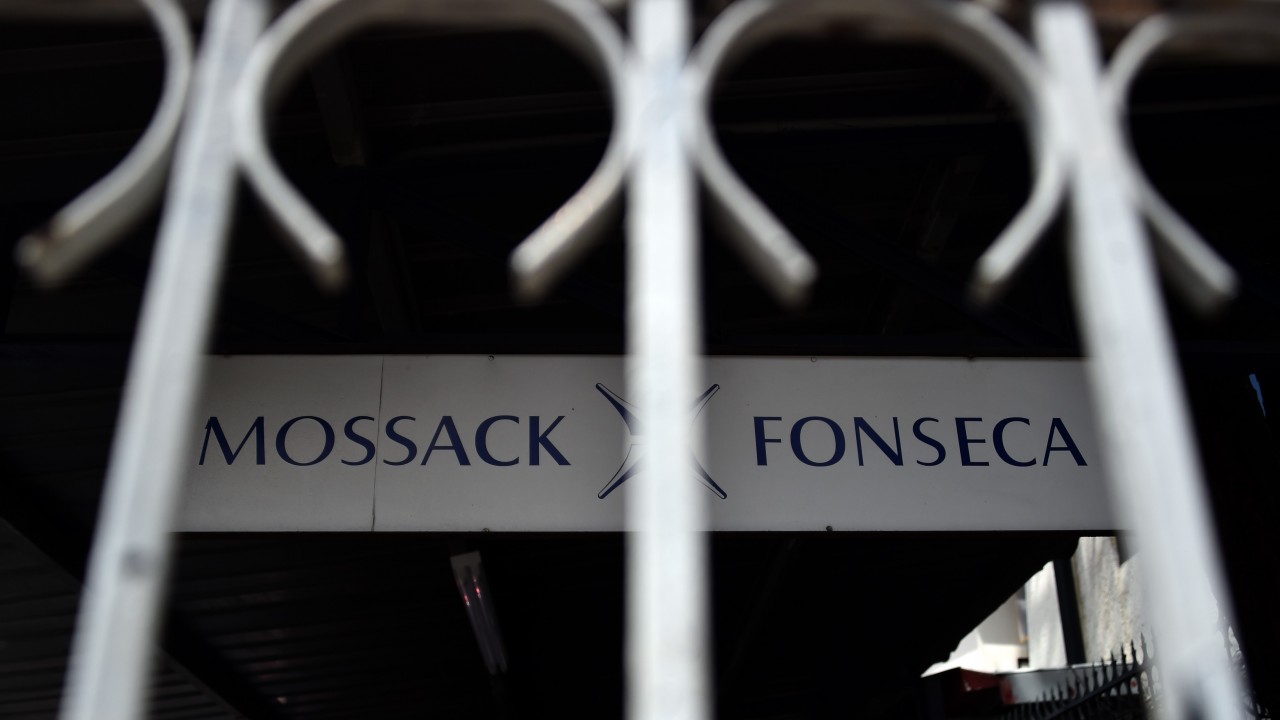
A sign outside Mossack Fonseca’s law offices in Panama City, on April 4, 2016. (Rodrigo Arangua/AFP/Getty Images)
— Süddeutsche Zeitung reporter Bastian Obermayer
The story started blasting out to the world on Sunday afternoon: an amazing windfall of data — more than eleven and a half million documents — the property of Mossack Fonseca, a Panamanian law firm that specializes in offshore tax havens, had been leaked to the press. Over 12 months, a worldwide network of some 400 reporters from more than 100 media organizations, coordinated by the International Consortium of Investigative Journalists, had gone to work analyzing the nearly four decades worth of information and uncovered a vast labyrinth of shady financial dealings linking back to Vladimir Putin; the governments of Syria, Pakistan, Qatar and Iceland (Iceland’s prime minister resigned on Tuesday); professional soccer; Bollywood and Jackie Chan, to name but a few.
Here are some links to learn more.
The best place to start is the International Consortium of Investigative Journalists’ own Panama Papers website, which has a complete collection of stories written so far, helpful explanatory videos and a sign-up for their mailing list that will email a guided tour of the documents and updates as more is revealed. Also useful and fascinating is the English-language version of Süddeutsche Zeitung’s Panama Papers site. That’s the German newspaper first approached by the anonymous source of the files, who offered this astonishing trove of information and warned, “My life is in danger.”
“How much data are we talking about?” reporter Bastian Obermayer asked.
“More than you have ever seen.”
The paper notes, “The data provides rare insights into a world that can only exist in the shadows. It proves how a global industry led by major banks, legal firms, and asset management companies secretly manages the estates of the world’s rich and famous: from politicians, Fifa officials, fraudsters and drug smugglers, to celebrities and professional athletes.”
Several articles describe how the story came to be. At Wired, Bastian Obermayer talks about his source and tells reporter Andy Greenberg, “I don’t know the name of the person or the identity of the person. But I would say I know the person. For certain periods I talked to [this person] more than to my wife.” And Fortune magazine’s Mathew Ingram offers background and writes, “[T]he Panamanian documents have triggered a number of major news stories in several different countries…
The documents also show that a number of holding companies with about $2 billion in assets are connected to a network of associates of Russian president Vladimir Putin, although the Russian government has rejected the suggestion of any impropriety.
Others implicated in the investigation include the presidents of Ukraine and Pakistan. Chinese leader Xi Jinping also appears to be connected to a number of holding companies as a way of avoiding tax, and so is British prime minister David Cameron, whose father appears to have used an offshore corporation to do so. Cameron has campaigned publicly against the avoidance of tax through similar means.”
At Vox, Matthew Yglesias adds that the documents reported on so far “offer the most granular look ever at a banal reality that’s long been hiding in plain sight.
Even as the world’s wealthiest and most powerful nations have engaged in increasingly complex and intensive efforts at international cooperation to smooth the wheels of global commerce, they have willfully chosen to allow the wealthiest members of Western society to shield their financial assets from taxation (and in many cases divorce or bankruptcy settlement) by taking advantage of shell companies and tax havens.
(Vox also has this easy to understand Panama Papers explainer, “an adorable comic about piggy banks.”)
At Esquire, Charlie Pierce writes that what we’ve seen is “certainly enough to give more weight to the possibility that every political system in the world — even the nakedly authoritarian ones — is hopelessly rigged, and that the marvelous new world of the miraculous global economy is an even bigger thieves’ paradise than you, me, or even Jamie Dimon thought it was…
Now, it’s time for all the governments named in these documents to come clean, and for their citizens to demand that they do so. And while there isn’t yet a major American political or financial figure tied to these files, the glimpse they give into how the international oligarchs do their business, while arranging to stiff their native countries of the taxes they by right ought to be paying, is bound to resonate in the current presidential election. These are the ultimate loopholes through which much of the world’s wealth disappears, never to return again.
Like Pierce, Time magazine’s Rana Foroohar believes that the Panama Papers reflect “one of the key issues at work in the U.S. presidential election.
Voters know at a gut level that our system of global capitalism is working mainly for the 1 %, not the 99 %. That’s a large part of why both Sanders and Trump have done well, because they tap into that truth, albeit in different ways. The Panama Papers illuminate a key aspect of why the system isn’t working — because globalization has allowed the capital and assets of the 1 % (be they individuals or corporations) to travel freely, while those of the 99% cannot. Globalization is supposed to be about the free movement of people, goods, and capital. But in fact, the system is set up to enable that mobility mainly for the rich (or for large corporations). The result is global tax evasion, the offshoring of labor, and an elite that flies 35,000 feet over the problems of nation states and the tax payers within them.
There’s lots more to come, and the International Consortium of Investigative Journalism says that by early May it will release a list of all the companies and people involved. As mentioned, so far, little of the reporting has touched directly on American involvement in the tax havens. At Yahoo Finance, Rick Newman and Mandi Woodruff write that’s because, “It turns out that rich Americans have less need for tax havens than their comrades elsewhere” — they pay much lower taxes. But an editor at Süddeutsche Zeitung says, hang on: “Just wait for what is coming next.”




